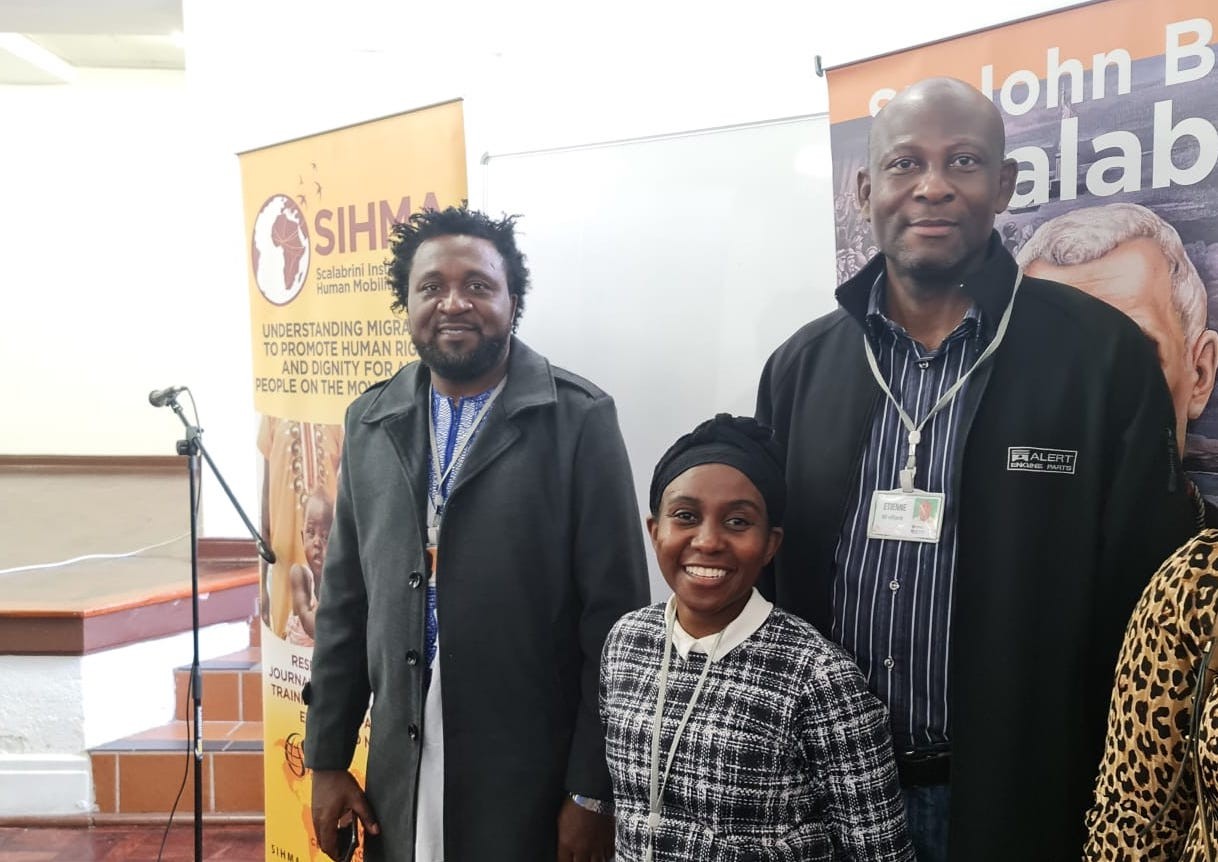
“WHAT’S EATING MY MIND?” FILM SCREENING EVENT REFLECTION
Prepared by Rachel Chinyakata
On Tuesday the 9th of May, the Scalabrini Institute for Human Mobility in Africa in partnership with the Scalabrini Centre of Cape Town hosted a film screening event for migrants and refugees. The film titled, “What’s Eating my Mind”, a production from STEPS South Africa’s Generation Africa project which features 25 medium and short films of the lived realities of African youth, through the lens of migration across 16 Anglophone and Francophone countries of Africa. The film “What’s Eating my Mind” features Noella Luka is a filmmaker who hospitalized and diagnosed with bipolar disorder and showcases complications that she navigates maintaining her mental health. Various stakeholders participated in the event including migrants and refugees, representatives from Caritas International, Fountain for Justice South Africa, Apostles of the Sea (Stella Maris), STEPS, Holy Cross Parish, and St John’s Cathedral Parish Cape Town.
The event began with welcoming remarks, introductions, and the purpose of the event lead by SIHMA representatives (Rachel and Muluh). Following this was short remarks from the SIHMA director Fr Filippo, the screening of the film and reflections from the screening. The main purpose of the screening this film was to have an understanding on migration and mental health, the way it is represented in this documentary and reflections about the existing gaps and available structures and mechanisms of support.
After the filming of the event a discussion facilitated by Shingi (the SCCT Women’s platform Manager), and Etienne (the SCCT Welfare Consultant) was conducted. From the discussion a number of reflections were noted. In terms of the way media portrays mental health in the lives of refugees and migrants, the participants agreed that the film portrays or reflects the reality of some migrants and refugees experiencing mental conditions. As per their reflection, whilst the minority of people in the society understand mental health, the majority do not understand and recognise mental condition especially the most common ones for example stress, depression, and anxiety, its only when the mental condition presents itself with serious symptoms when people act. Furthermore, the participants indicated that mental health is not something that people talk about, mostly some people are not comfortable to discuss issues of mental health whilst others ignore it as long as there are no physical symptoms. Linked to this, there is ignorance when it comes to mental condition thus, many people do not get proper diagnosis and support.
Additionally, the attendees of the event indicated that mental health could impair with everyday functioning for example work, thoughts, feelings and actions. Although this is a fact, they mentioned that sometimes when functioning is impaired people blame it on other things like drug abuse, laziness and being disorganised and rarely on the real challenge. Thus, reflecting lack of awareness, understanding and acceptance of mental health conditions.
Furthermore, it was also noted that living with and managing a mental condition is a process that firstly needs a person to acknowledge that there is something wrong, and that they are vulnerable and need relevant support to manage the condition as highlighted by the movie. Both Noella and Nick accepted what they were experiencing and their vulnerabilities which was an important step in getting help. Although Noella had support and had would make positive progressions, the audience noted that it is not always the reality in most African families or societies because of the stigma, fear, denial, and lack of understanding of mental health symptoms. Due to some of these reasons people end up not opening-up on issues of mental health. This reflection was supported by Nick’s journey as reflected in the film, his family did not understand mental health and the society was less supportive towards him. This indicates a gap in terms of mental health support not only for migrants and refugees but everyone who needs such kind of support. During the reflection of the film, it was also noted that although there are services in Cape Town for mental health and psychosocial support, few of the migrants and refugees know and utilise these services.
Families and communities where were noted to be the most immediate and important avenues for support besides the service providers, hence knowledge and awareness interventions should be targeted towards them. Based on the screening the participants available also reiterated the significance of understanding that mental health is complex and whilst some journeys are similar many people experience their journeys differently and for some it can be over a short period but for some ongoing, therefore it is important to understand each individual experiences, and symptoms in order to provide adequate support. In addition, healing was indicated as a process that might take time and needs a holistic approach. For example, prayer was pointed out to be essential but not a substitute for medication. For healing to occur all the aspects that make up an individual were indicated to be important and structures at all levels of the society (individual, family, community and societal) must play a role.
In concluding the event, available structures and mechanisms for support compiled by SIHMA and the SCCT was shared with the attendees of the event in addition to the services that they were already aware of. The attendees also pointed out the need for more film productions on mental health and thought-provoking events similar to this film screening event as a way of raising awareness on mental health. Additionally, the need for evidence-based research on mental health was also noted to help in informing mental health interventions.
Categories:
Tags:

